
Suggested Messaging:
La influenza aviar se está propagando en algunos animales como aves de corral y vacas. Aunque es poco común y el riesgo para la mayoría es bajo, la influenza aviar puede infectar a las personas.
Si estás cerca o trabajas con aves de corral, vacas lecheras o leche cruda (no pasteurizada) y tienes síntomas de influenza aviar, comunícate con tu departamento local de salud.
#InfluenzaAviar
|

Suggested Messaging:
La influenza aviar se está propagando en animales como aves de corral y vacas. El riesgo actual de contraer influenza aviar para la mayoría de las personas es bajo y la infección humana es rara. Las personas que trabajan con animales infectados corren un mayor riesgo.
Usa protección cuando te acerques a animales que podrían estar infectados. Métodos de protección incluyen:
- Respirador aprobado por NIOSH®
- “Goggles” o protector facial
- Overoles
- Gorros
- Botas
- Guantes
#H5N1 #InfluenzaAviar
X:
La influenza aviar se está propagando en animales como aves de corral y vacas. El riesgo actual para el público es bajo y la infección humana es rara. Las personas que trabajan con animales infectados corren un mayor riesgo.
|

Suggested Messaging:
La influenza aviar se está propagando en animales como aves de corral y vacas. La influenza aviar puede infectar a las personas que estén cerca de ellos. Usa protección cuando te acerques a animales que podrían estar infectados. Métodos de protección incluyen:
- Respirador aprobado por NIOSH®
- Gafas o protector facial
- Overoles
- Gorros
- Botas
- Guantes
#H5N1 #GripeAviar
X:
La influenza aviar se está propagando en animales como aves de corral y vacas. Usa protección cuando te acerques a animales que podrían estar infectados. Obtén más información en:
#H5N1 #GripeAviar
|

|

|

|

|

Suggested Messaging: La gripe aviar se ha encontrado en aves de corral, vacas lecheras y gatos domésticos en California. La gripe aviar puede ser grave y provocar la muerte de los animales.
Protege a tus mascotas:
- Evita alimentar a tu mascota con carne/aves crudas, incluidos los alimentos crudos para mascotas o la leche no pasteurizada (cruda)
- Mantén a tus gatos dentro de casa, si es posible.
- Evita que las mascotas coman animales muertos, si es posible.
- Mantén a las mascotas alejadas de las aves silvestres, las aves de corral y el ganado
X: La gripe aviar se ha encontrado en aves de corral, vacas lecheras y gatos en CA. Protege a tus mascotas:
- Evita alimentar a tu mascota con carne o leche cruda
- Mantén a tus gatos adentro, si es posible, lejos de aves silvestres, aves de corral y ganado
|

Suggested Messaging:
Elegir leche y productos lácteos pasteurizados es la mejor manera de disfrutar de forma segura de los beneficios nutricionales de la leche, y evitar enfermarse. El consumo de leche cruda puede conllevar graves riesgos para la salud. La pasteurización inactiva el virus de la influenza aviar y los gérmenes dañinos que pueden causar enfermedades.
#InfluenzaAviar #ElijePasteurizado #SeguridadLáctea
X:
Elegir leche pasteurizada y productos lácteos es la mejor manera de disfrutar de forma segura de los beneficios nutricionales de la leche sin los riesgos de la gripe aviar o intoxicación alimentaria.
|

Suggested Messaging:
El consume de leche o productos lácteos crudos puede ser peligroso. Disminuye el riesgo eligiendo leche y productos lácteos pasteurizados como queso y yogur. La pasteurización es el proceso de calentar la leche a temperaturas específicas por cierto tiempo, el cual inactiva el virus de la gripe aviar y los gérmenes dañinos que se pueden encontrar en la leche cruda. Elegir leche y productos lácteos pasteurizados es la mejor forma de disfrutar de manera segura de los beneficios nutricionales de la leche.
#InfluenzaAviar #EligeLaPasteurización #SeguridadLáctea
X:
La pasteurización es el proceso de calentar la leche a temperaturas específicas por cierto tiempo, el cual inactiva el virus de la gripe aviar y los gérmenes dañinos que se pueden encontrar en la leche cruda. Elige leche y productos lácteos pasteurizados.
|

Suggested Messaging:
¿Por qué es importante la pasteurización? La pasteurización es el proceso de calentar bebidas y productos lácteos (como la leche) para eliminar el virus de la gripe aviar y otros gérmenes dañinos que pueden enfermarte. Para protegerte a ti y a tu familia, elige productos lácteos que digan “pasteurizado” en la etiqueta.
#InfluenzaAviar #EligeLaPasteurización #SeguridadLáctea
X:
La pasteurización es el proceso de calentar bebidas y productos lácteos (como la leche) para eliminar el virus de la gripe aviar y otros gérmenes dañinos que pueden enfermarte. Protégete a ti y a tu familia, elige productos lácteos pasteurizados.
|

Suggested Messaging:
Existen riesgos para la salud al beber leche cruda (sin pasteurizar). Los gérmenes en la leche cruda pueden enfermar gravemente a algunas personas, especialmente a los niños pequeños (menores de 5 años), a las personas embarazadas y a las personas con sistemas inmunitarios debilitados. ¡Por la seguridad de tu familia, elige leche pasteurizada!
#InfluenzaAviar #EligeLaPasteurización #SeguridadLáctea
X:
Existen riesgos para la salud al beber leche cruda (sin pasteurizar). La pasteurización inactiva el virus de la gripe aviar y otros gérmenes que podrían enfermar gravemente a las personas. ¡Como precaución, elige leche pasteurizada!
https://www.cdph.ca.gov/Programs/CID/DCDC/Pages/LecheCruda.aspx
|
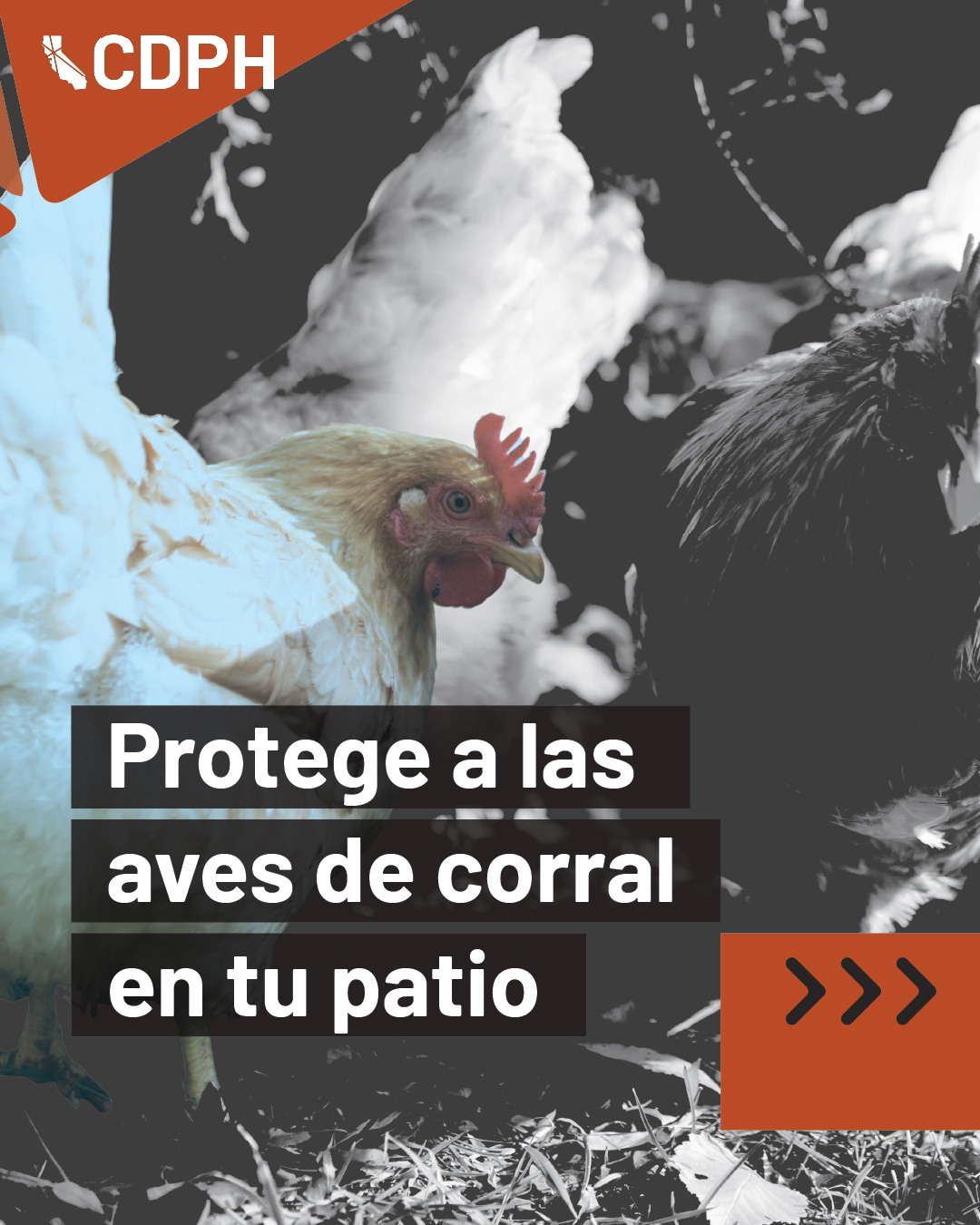
|
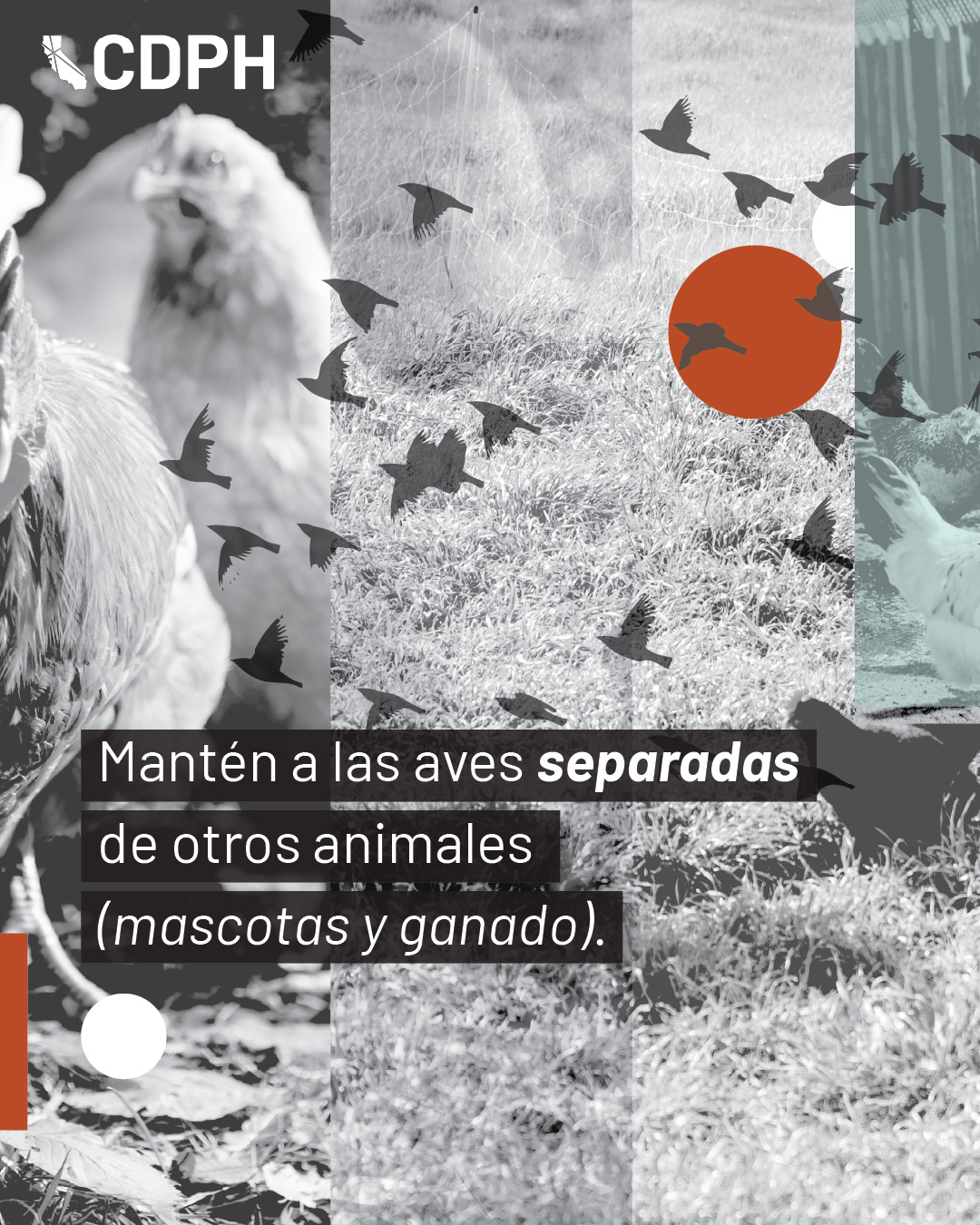
|
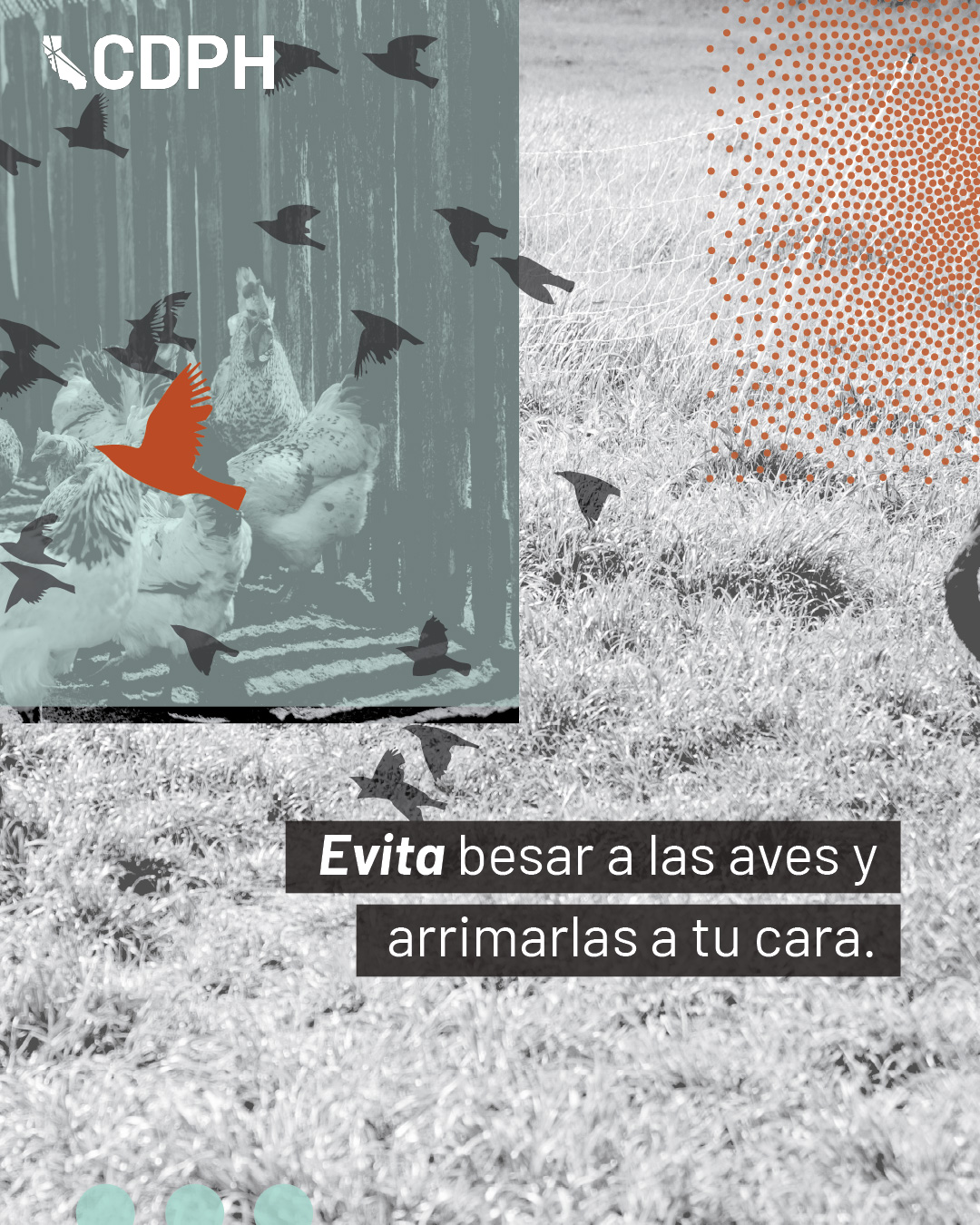
|
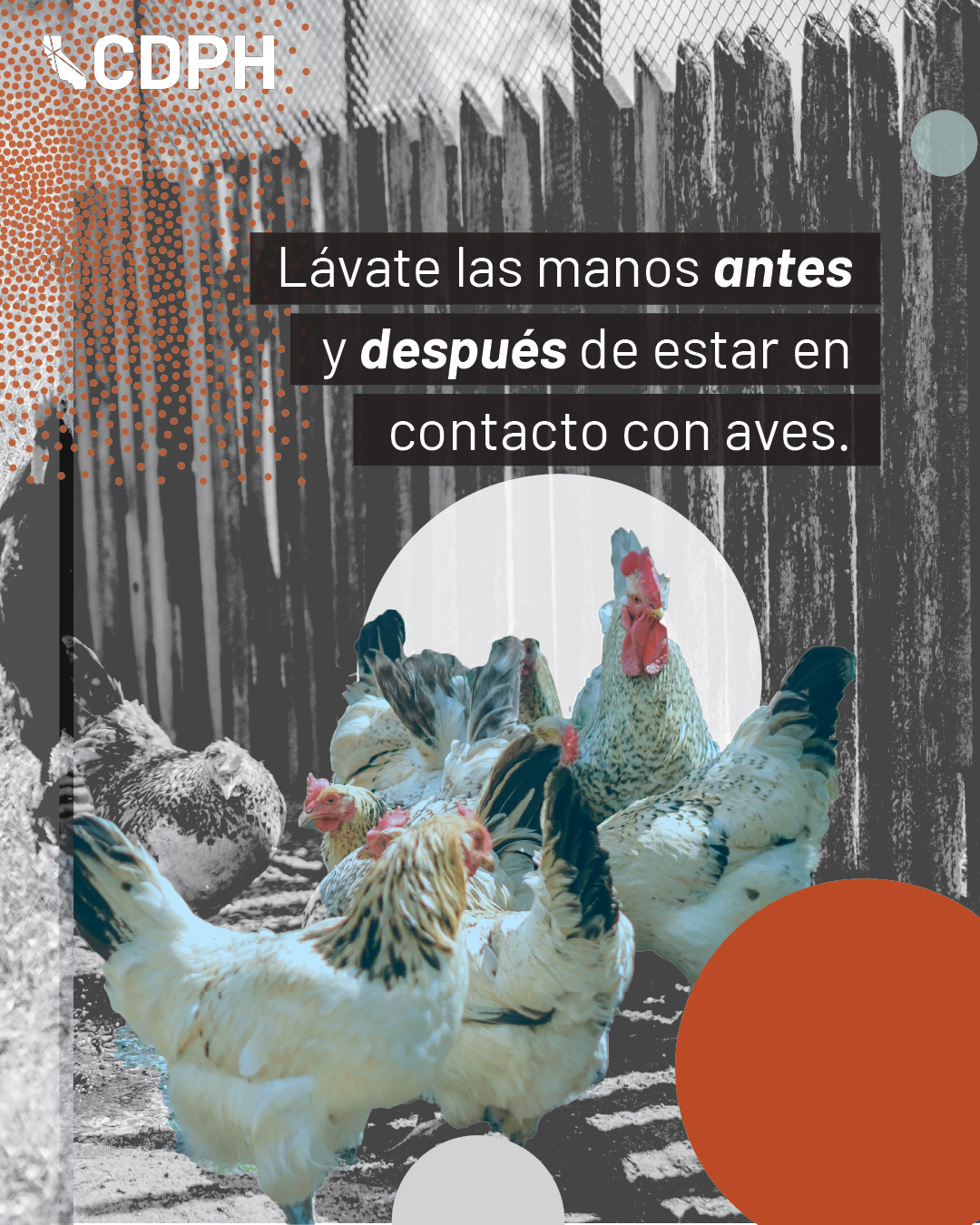
|
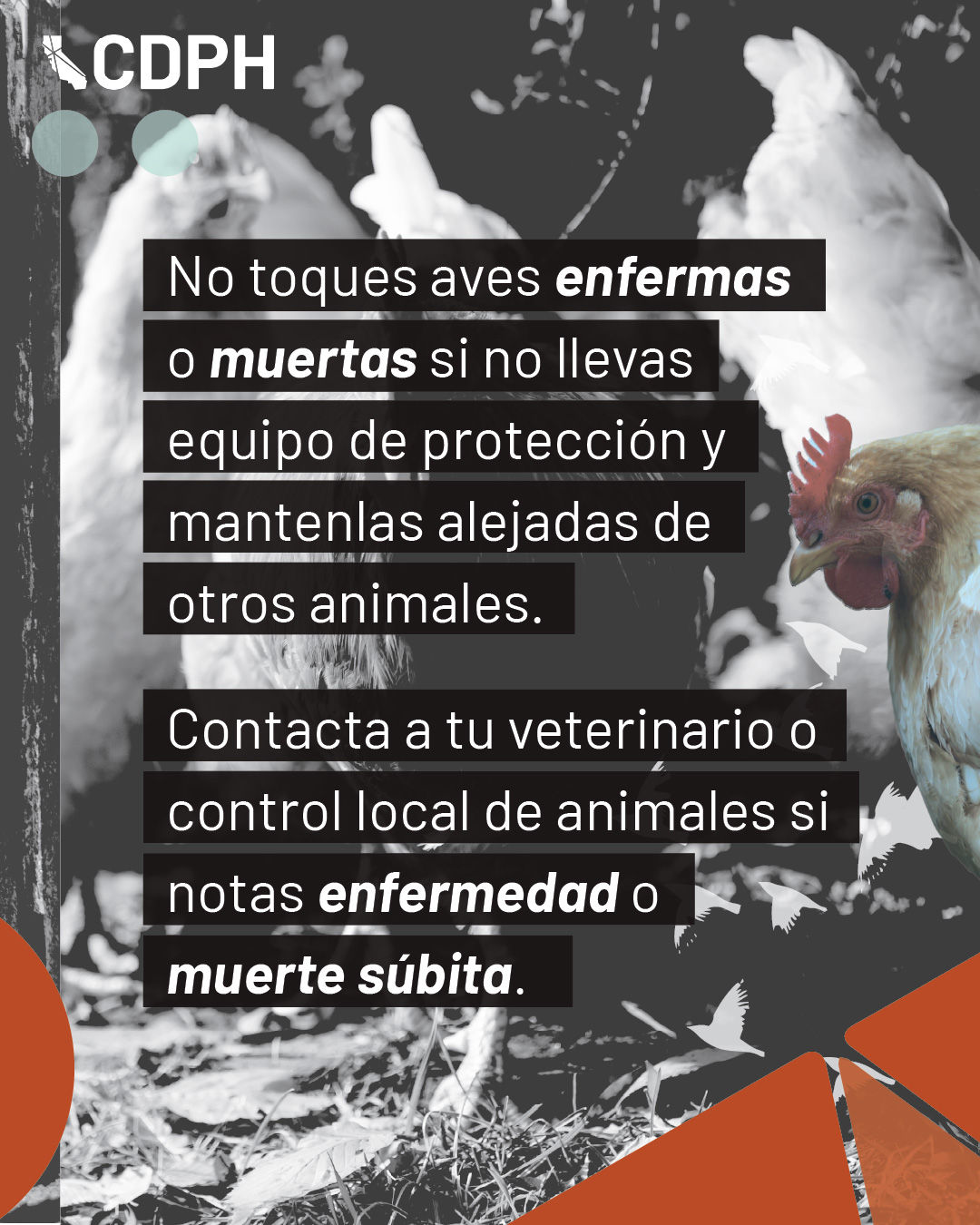
Suggested Messaging: USDA reporta un aumento de virus de gripe aviar en aves salvajes, de corral y bandadas comerciales en ciertos estados de EE. UU. Pese a su nombre, la gripe aviar es un virus que puede propagarse a otros animales, incluyendo humanos. El riesgo actual para personas es bajo. Sin embargo, si tienes aves de corral, protégete y protege a tu familia de la gripe aviar con estos simples pasos. Infórmate en: go.cdph.ca.gov/birdflu #GripeAviar #H5N1
X/Bluesky Copy: USDA reporta un aumento de virus de gripe aviar en aves de corral en un número de estados. El riesgo actual para personas es bajo. Protege a tu bandada y a tu familia de la gripe aviar con estos simples pasos. Infórmate en: go.cdph.ca.gov/birdflu #GripeAviar #H5N1 |
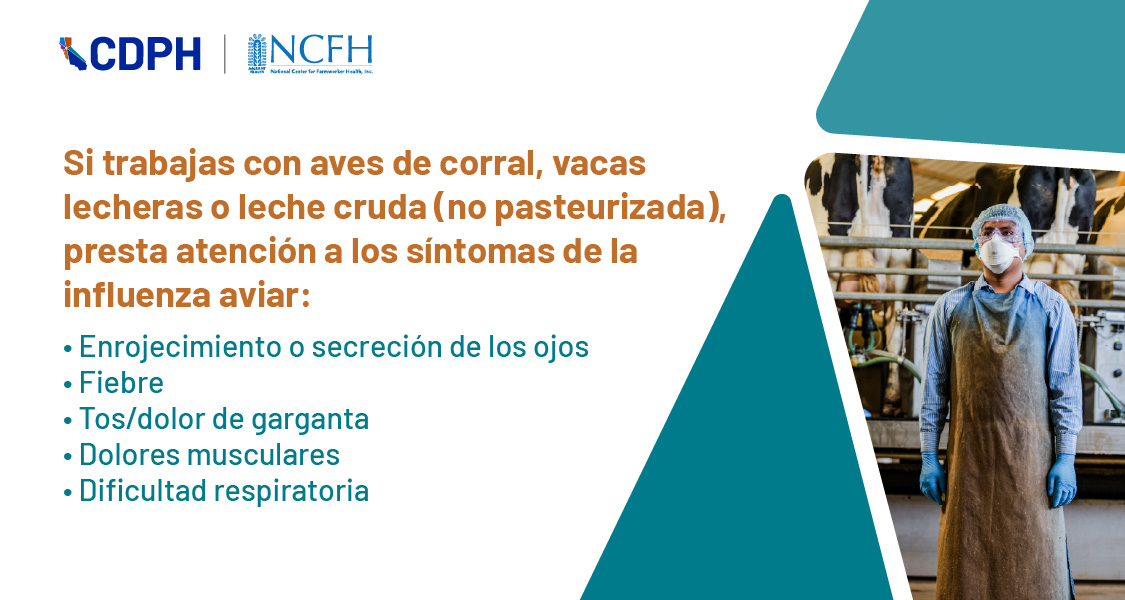
Suggested Attachment:
Protėjase de la gripe aviar cuando trabaje con vacas lecheras infectadas (PDF, 3MB)
Suggested Messaging: La influenza aviar se está propagando en algunos animales como aves de corral y vacas. Aunque es poco común y el riesgo para la mayoría es bajo, la influenza aviar puede infectar a las personas.
Si estás cerca o trabajas con aves de corral, vacas lecheras o leche cruda (no pasteurizada) y tienes síntomas de influenza aviar, comunícate con tu departamento local de salud.
Comuníquese con la línea de ayuda Una Voz para La Salud del Centro Nacional para la Salud de Trabajador Agrícola a
📲 +1 (800) 377-9968
✅ WhatsApp a + 1 (737) 999-4162
|
|
Suggested Attachment:
Quė Necesitas Saber Sobre La Gripe Aviar (YouTube)
Suggested Messaging:
La Dra. Erica Pan, directora del Departamento de Salud Pública de California, explica cómo protegerse contra la gripe aviar, un virus que se propaga a través de aves silvestres en todo el mundo y causa brotes en aves de corral y vacas lecheras.
Se han encontrado algunos casos en humanos, principalmente entre quienes trabajan con animales infectados. Conozca los riesgos, síntomas y prevención.
Comuníquese con la línea de ayuda Una Voz para La Salud del Centro Nacional para la Salud de Trabajador Agrícola a
📲 +1 (800) 377-9968
✅ WhatsApp a + 1 (737) 999-4162
El personal del NCFH estará disponible para ofrecerle ayuda en su idioma. Infórmase más:
https://www.cdph.ca.gov/Programs/CID/DCDC/Pages/Influenza-Aviar.aspx
|
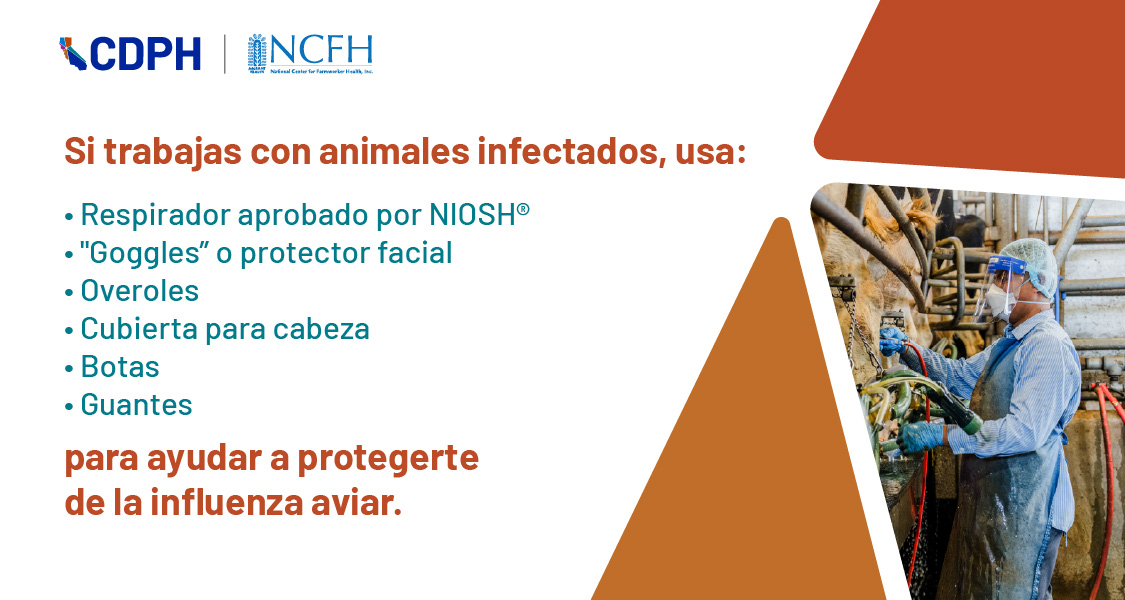
Suggested Attachment:
Tienen gripe aviar los animales donde trabaja? (PDF, 3MB)
Suggested Messaging: La influenza aviar se está propagando en animales como aves de corral y vacas. El riesgo actual de contraer influenza aviar para la mayoría de las personas es bajo y la infección humana es rara. Las personas que trabajan con animales infectados corren un mayor riesgo.
Usa protección cuando te acerques a animales que podrían estar infectados. Métodos de protección incluyen:
Comuníquese con la línea de ayuda Una Voz para La Salud del Centro Nacional para la Salud de Trabajador Agrícola a
📲 +1 (800) 377-9968
✅ WhatsApp a + 1 (737) 999-4162
El personal del NCFH estará disponible para ofrecerle ayuda en su idioma. Infórmase más:
https://www.cdph.ca.gov/Programs/CID/DCDC/Pages/Influenza-Aviar.aspx
|
|
Suggested Attachment: Tienen gripe aviar los animales donde trabaja? (PDF, 3MB)
Suggested Messaging:
Si trabajas con aves de corral, vacas lecheras o leche cruda (leche bronca)- no pasteurizada, conozca los riesgos, síntomas y prevención de la gripe aviar.
Comuníquese con la línea de ayuda Una Voz para La Salud del Centro Nacional para la Salud de Trabajador Agrícola a
📲 +1 (800) 377-9968
✅ WhatsApp a + 1 (737) 999-4162
El personal del NCFH estará disponible para ofrecerle ayuda en su idioma. Infórmase más: https://www.cdph.ca.gov/Programs/CID/DCDC/Pages/Influenza-Aviar.aspx
|

Suggested Attachment:
Protėjase de la gripe aviar cuando trabaje con vacas lecheras infectadas (PDF, 3MB)
Suggested Messaging:
Las vacunas más recientes contra la gripe y COVID-19 pueden ayudar a proteger a los trabajadores agrícolas y sus familias. Todas las personas mayores de 6 meses pueden recibir estas vacunas. Mantenerse al día con las vacunas es un paso importante que puede tomar para protegerse a sí mismo y a su familia.
Comuníquese con la línea de ayuda Una Voz para La Salud del Centro Nacional para la Salud de Trabajador Agrícola a
📲 +1 (800) 377-9968
✅ WhatsApp a + 1 (737) 999-4162
El personal del NCFH estará disponible para ofrecerle ayuda en su idioma. Para obtener más información o para saber dónde usted y su familia pueden obtener vacunas contra la gripe y el COVID-19, gratis o a bajo costo,
https://www.ncfh.org/callforhealth.html
|
|

Suggested Attachment:
Protėjase de la gripe aviar cuando trabaje con vacas lecheras infectadas (PDF, 3MB)
Suggested Messaging:
Las vacunas más recientes contra la gripe y el COVID-19 pueden ayudarle a evitar que se enferme y pierda días de trabajo en la granja. Ponerse estas vacunas también puede ayudar a proteger a sus compañeros de trabajo y a su familia para que no se enfermen. Mantenerse al día con las vacunas puede ayudarle a usted y a sus seres queridos a mantenerse saludables.
Comuníquese con la línea de ayuda Una Voz para La Salud del Centro Nacional para la Salud de Trabajador Agrícola a
📲 +1 (800) 377-9968
✅ WhatsApp a + 1 (737) 999-4162
El personal del NCFH estará disponible para ofrecerle ayuda en su idioma. Para obtener más información o para saber dónde usted y su familia pueden obtener vacunas contra la gripe y el COVID-19, gratis o a bajo costo, https://www.ncfh.org/callforhealth.html
|

Suggested Messaging: El virus de la gripe aviar y otros gérmenes dañinos pueden encontrarse en la leche cruda (leche bronca) y causar enfermedades graves. Mezclar leche cruda con alcohol no ofrece la misma protección que la pasteurización.
Tampoco lo hará prender fuego al alcohol. Es posible que aún haya bacterias y virus dañinos.
La pasteurización es el proceso de calentar alimentos como la leche para matar el virus de la gripe aviar y otros gérmenes dañinos.
¡Elige leche pasteurizada para la seguridad de tu salud y la de tu familia!
Más información en
go.cdph.ca.gov/birdflu
|